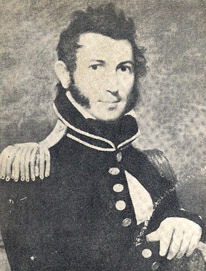John M. Gamble
| John M. Gamble | |
|---|---|
 |
|
| Born | 1791 Brooklyn, New York |
| Died | 11 September 1836 (aged 44–45) New York City |
| Allegiance |
|
| Service/branch |
|
| Years of service | 1809-1836 |
| Rank | Brevet Lieutenant Colonel |
| Unit | USS Essex |
| Commands held |
Greenwich Sir Andrew Hammond Fort Madison |
| Battles/wars | |
| Other work | Artist |
Brevet Lieutenant Colonel John Marshall Gamble (1791 – 11 September 1836) was an officer in the United States Marine Corps during the early 19th century. He was the first, and remains the only known, U.S. Marine to command a U.S. Navy ship, commanding the prize ships Greenwich and the Sir Andrew Hammond during the War of 1812.
Born in Brooklyn, New York, Gamble was commissioned a second lieutenant in the Marine Corps on 16 January 1809 at the age of 17.
Stationed in the South Sea in the Marine Detachment aboard the frigate USS Essex during the War of 1812, he rose to the rank of captain by June 1814. He distinguished himself in many enterprises, including encounters with people of the Marquesas Islands during the absence of USS Essex in 1813, and sailing a prize of Essex with only a four-man crew and without benefit of a chart in a 17-day voyage to the Hawaiian Islands.
Lieutenant Colonel Gamble is chiefly remembered in history as the only U.S. Marine to command a U.S. Navy ship, commanding two separate prize ships, the USS Greenwich and USS Sir Andrew Hammond, during the War of 1812: "...and, for want of sea officers, I placed Lieutenant Gamble of the Marines in charge of the Greenwich."
His capture of the British armed whaler Seringapatam was noted as a triumph by American newspapers and thus earned him considerable fame upon his return. The Seringapatam was deemed as the biggest British threat to American whalers in the South Pacific at the time.
On 14 July 1813, Commodore Porter wrote of Lieutenant Gamble: "Allow me to return to you my thanks for your handsome conduct in bringing the Seringapatam to action, which greatly facilitated her capture, while it prevented the possibility of her escape. Be assured, sir, I shall make a suitable representation of the affair to the honorable Secretary of the Navy."
...
Wikipedia
